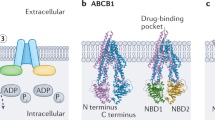Abstract
The physiology of the multidrug transporter P-glycoprotein (Pgp) is still poorly understood. We now show evidence that cell lines with a high expression of Pgp display a reduced accumulation of cortisol and an ATP-dependent outward transport of the hormone. Cortisol efflux from Pgp negative cells does not have such an active component. Further we show that the steroid hormones cortisol, testosterone, and progesterone cause an immediate, dose-dependent increase of daunorubicin accumulation in Pgp overexpressing cells. These effects are particularly apparent for the more lipophilic steroids. These results demonstrate that Pgp may function as a transporter for cortisol and suggest a physiological role of the protein in steroid handling by organs such as the adrenal.
Similar content being viewed by others
Author information
Authors and Affiliations
Rights and permissions
About this article
Cite this article
van Kalken, C., Broxterman, H., Pinedo, H. et al. Cortisol is transported by the multidrug resistance gene product P-glycoprotein. Br J Cancer 67, 284–289 (1993). https://doi.org/10.1038/bjc.1993.54
Issue Date:
DOI: https://doi.org/10.1038/bjc.1993.54
- Springer Nature Limited
This article is cited by
-
A proteome-wide map of 20(S)-hydroxycholesterol interactors in cell membranes
Nature Chemical Biology (2021)
-
ATP-binding cassette (ABC) transporters in caprine preantral follicles: gene and protein expression
Cell and Tissue Research (2018)
-
Effects of Testosterone on the Functional Activity of P-Glycoprotein
Pharmaceutical Chemistry Journal (2017)
-
Pharmacogenetics and pharmacogenomics in rheumatology
Immunologic Research (2013)
-
Localization of breast cancer resistance protein (Bcrp) in endocrine organs and inhibition of its transport activity by steroid hormones
Cell and Tissue Research (2012)




